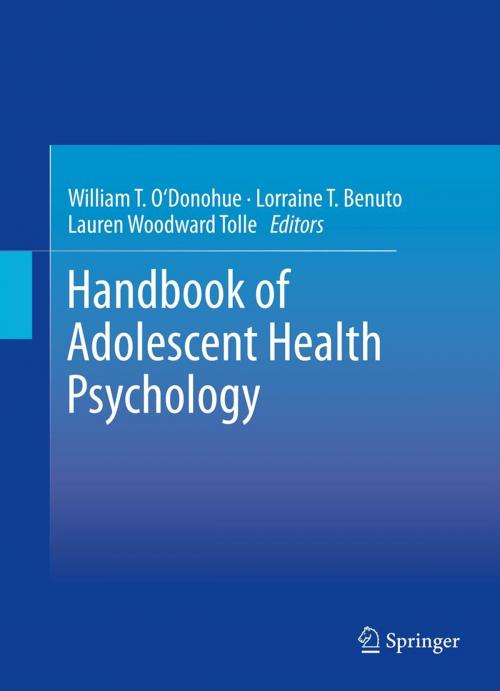Handbook of Adolescent Health Psychology
Nonfiction, Health & Well Being, Medical, Specialties, Family & General Practice, Psychology, Applied Psychology| Author: | ISBN: | 9781461466338 | |
| Publisher: | Springer New York | Publication: | July 8, 2014 |
| Imprint: | Springer | Language: | English |
| Author: | |
| ISBN: | 9781461466338 |
| Publisher: | Springer New York |
| Publication: | July 8, 2014 |
| Imprint: | Springer |
| Language: | English |
Adolescence is a pivotal period of development with respect to health and illness. It is during adolescence that many positive health behaviors are consolidated and important health risk behaviors are first evident; thus, adolescence is a logical time period for primary prevention. In addition, the predominant causes of morbidity and mortality in adolescence are quite different from those of adults, indicating that early identification and treatment of adolescent health problems must be directed to a unique set of targets in this age group. Moreover, because of the particular developmental issues that characterize adolescence, intervention efforts designed for adults are often inappropriate or ineffective in an adolescent population. Even when chronic illnesses are congenital or begin in childhood, the manner in which the transition from childhood to adolescence to young adulthood is negotiated has important implications for disease outcomes throughout the remainder of the person’s life span. Organized in five major sections (General Issues, Developmental Issues, Treatment and Training, Mental Health, and Physical Health) and 44 chapters, Handbook of Adolescent Health Psychology addresses the common and not so common health issues that tend to affect adolescents. Coverage includes: ▪ Context and perspectives in adolescent health psychology ▪ Health literacy, health maintenance, and disease prevention in adolescence ▪ Physical disorders such as asthma, obesity, physical injury, and chronic pain ▪ Psychological disorders such as substance abuse, attention deficit hyperactivity disorder, depression, and eating disorders ▪ Congenital chronic diseases such as type 1 diabetes and spina bifida Handbook of Adolescent Health Psychology is the definitive reference for pediatricians, family physicians, health psychologists, clinical social workers, rehabilitation specialists, and all practitioners and researchers working with adolescents.
Adolescence is a pivotal period of development with respect to health and illness. It is during adolescence that many positive health behaviors are consolidated and important health risk behaviors are first evident; thus, adolescence is a logical time period for primary prevention. In addition, the predominant causes of morbidity and mortality in adolescence are quite different from those of adults, indicating that early identification and treatment of adolescent health problems must be directed to a unique set of targets in this age group. Moreover, because of the particular developmental issues that characterize adolescence, intervention efforts designed for adults are often inappropriate or ineffective in an adolescent population. Even when chronic illnesses are congenital or begin in childhood, the manner in which the transition from childhood to adolescence to young adulthood is negotiated has important implications for disease outcomes throughout the remainder of the person’s life span. Organized in five major sections (General Issues, Developmental Issues, Treatment and Training, Mental Health, and Physical Health) and 44 chapters, Handbook of Adolescent Health Psychology addresses the common and not so common health issues that tend to affect adolescents. Coverage includes: ▪ Context and perspectives in adolescent health psychology ▪ Health literacy, health maintenance, and disease prevention in adolescence ▪ Physical disorders such as asthma, obesity, physical injury, and chronic pain ▪ Psychological disorders such as substance abuse, attention deficit hyperactivity disorder, depression, and eating disorders ▪ Congenital chronic diseases such as type 1 diabetes and spina bifida Handbook of Adolescent Health Psychology is the definitive reference for pediatricians, family physicians, health psychologists, clinical social workers, rehabilitation specialists, and all practitioners and researchers working with adolescents.















